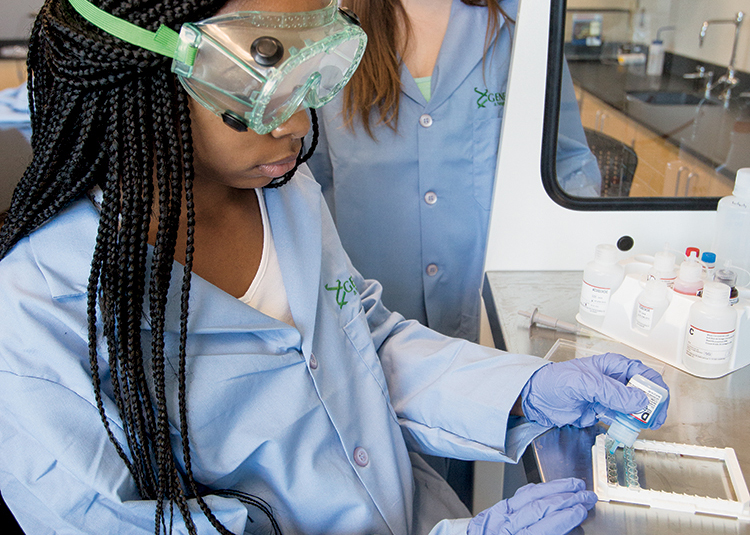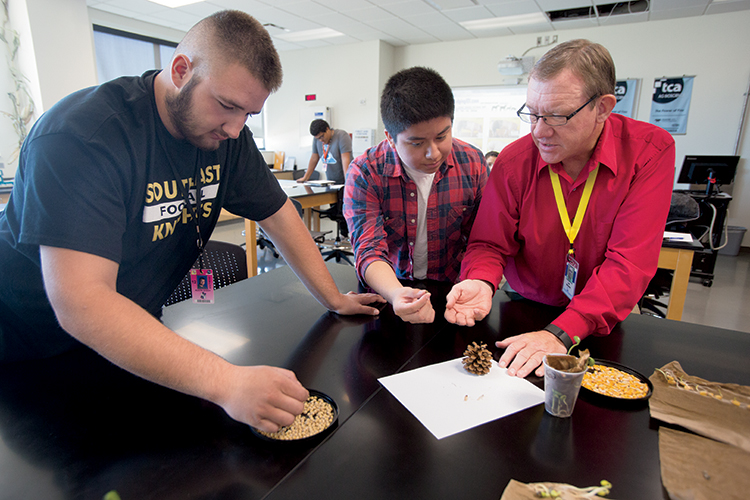Home > Nebraska > Nebraska Ag Education > Nebraska is Cultivating Ag Careers
Nebraska is Cultivating Ag Careers

The future of Nebraska agriculture is in the hands of its youth. With one out of every four jobs in the state connected to agriculture, Nebraska’s number one industry relies on the bright, malleable minds of students to continue filling its ranks.
To foster interest for agriculture careers, Lincoln Public Schools and Southeast Community College (SCC) partnered to launch an ag education program at The Career Academy (TCA) in August 2015. TCA helps provide high school juniors and seniors with real-world experiences in six different career clusters through dual-credit courses (meaning some can transfer as college credit), with 16 different pathways. One of the clusters is agriculture, food and natural resources, which branches into the career pathways in the ag biosciences and food science fields.
“The clusters of TCA represent career paths in Nebraska. Skills and knowledge in the science, business and technology used in agriculture serve as the focus for students,” says Matt Kreifels, state director of ag education at the Nebraska Department of Education. “This is Lincoln’s first venture into significant career preparation for students interested in agriculture.”
Untapped Potential
Tom Wheeldon is a teacher for the program, leading classes that include Introduction to Agriculture and Natural Resources, Crop and Food Science, and its accompanying lab. The classes are SCC-level courses, so students are being taught at a more challenging level.
“We have great students in Lincoln whose talents have been virtually untapped,” Wheeldon says. “By providing exposure to ag bioscience, we can home-grow future agriculturalists. We might be educating the future scientist that solves issues of feeding a growing planet.”
Though agriculture is Nebraska’s largest industry, there aren’t nearly enough college graduates to fill the open positions Kreifels says. Many students are unaware that out of 300 agriculture jobs, only one is a farmer.
“There are 299 other things that students can do in the agriculture industry that either support the farmer or move products to the consumer,” Kreifels says. “Through this program, students are not only getting an introduction to the ag industry, but also to plant sciences, animal sciences and biotechnology, so they’re prepared for those careers.”
Interested students travel to the TCA building and spend half the school day participating in classes on the program’s curriculum. Core academic classes are mixed in, which Kreifels notes is significant since it allows teachers to contextualize core academics using industry examples.
“When students ask why they need to know that, the answer is ingrained in a corresponding class,” he says.
In the first semester, students take Wheeldon’s Introduction to Agriculture and Natural Resources class, which covers a broad overview of Nebraska agriculture, including agribusiness, biotechnology, ag mechanics, food science and more.
“In each of these units we stress careers and try to include industry tours and/or speakers,” Wheeldon says.
A second-semester class, Crop and Food Science, focuses on understanding the importance of plants to agriculture from both a row crop and horticulture perspective. It also includes a lab component, where students conduct hands-on research.
“Future courses will focus on biotechnology and food science,” Wheeldon says. “A greenhouse is also planned to provide more opportunities.”

Planning Ahead
Both Wheeldon and Kreifels agree that the TCA program is a great move for agricultural education in Nebraska, which is already strong in the state.
“We’ve had a 30 percent growth in the past five years in schools offering ag education programs,” Kreifels says. “It’s important not only for students to know what their options are, but for Nebraska’s economy as well, because it’s rooted in the ag industry. If we can’t attract and retain the talented students we have to this industry, it will impact the state’s economy and local communities.”
Wheeldon pointed out that even with more than 170 ag education programs at the high school level, colleges still can’t meet the industry’s demand for qualified graduates.
“The USDA has identified that there are on average 57,000 annual openings in the ag industry where they’re looking to hire four-year college graduates,” Kreifels says. “They can only find about 61 percent of people with degrees to fill them. With this program and others, we’re helping to show students there is abundant opportunity in the industry.”
From Urban to Ag
NAYI Omaha connects urban students with ag careers
A new Nebraska Agricultural Youth Institute (NAYI) program is planting seeds of inspiration within Omaha students, hoping they will consider careers in agriculture.
“There are so many careers in the agriculture industry and not enough college graduates pursuing those careers,” says Christin Kamm, public information officer with the Nebraska Department of Agriculture.
The inaugural NAYI Omaha event took place in July 2015, branching off the annual NAYI week-long conference held each summer for high school juniors and seniors across the state. Nebraska’s NAYI conference is the longest-running program of its kind in the U.S. It has been held for 45 years and features speakers, workshops, ag education, networking and other activities.
As for NAYI Omaha, “We wanted to hit a metro audience – kids who aren’t from the farm,” Kamm says. Many of the week-long NAYI delegates already have an ag background.
During NAYI Omaha, around 150 Omaha and surrounding area students spent their day learning about the numerous agriculture-related careers available in the Omaha metro area. More than 20 speakers were featured, and students learned about seven different educational and career paths ranging from food science to engineering.
“We did our best to make sure the speakers didn’t necessarily have an ag background – that they did not grow up on the farm and instead chose a career in the agriculture industry,” Kamm says. “This way, Omaha students could really see themselves in the panel of speakers that we had.”
Learn more about NAYI at nda.nebraska.gov/nayi.



